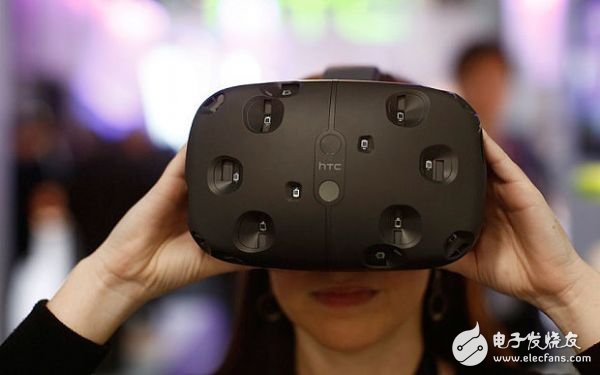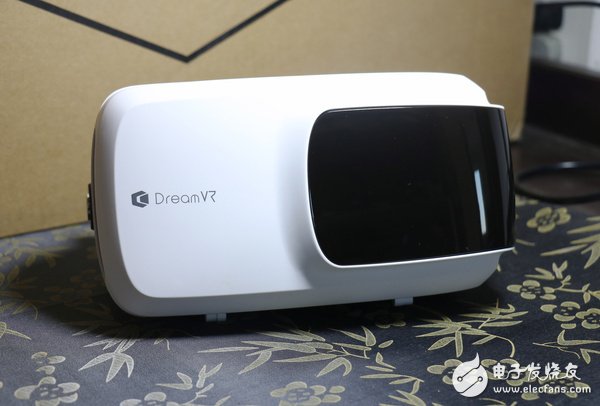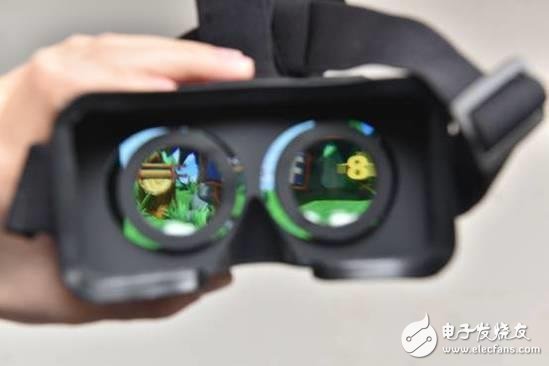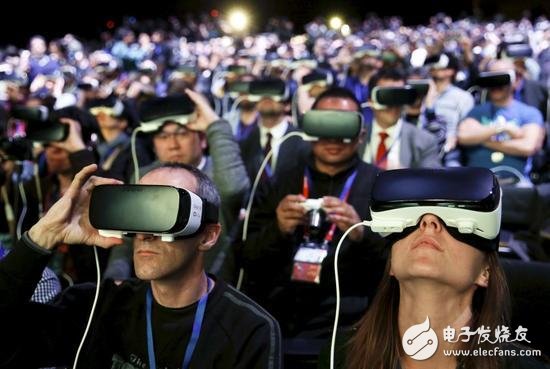At present, although domestic mobile phones occupy 80% of the global market, the lack of creative and subversive works in the Red Sea has become an indisputable fact. Today, Huawei, ZTE, HTC and other traditional mobile phone giants have launched VR devices, and glory, Xiaomi, LeTV and other Internet mobile phones have also entered VR. VR is said to be born to subvert the WeChat platform, then, can you save the domestic mobile phone that is getting worse?
First, why did the domestic machine enter the VR industry?
1. The capital market is hot.
According to Ai Media Consulting, the market size of China's VR industry in 2015 was 1.54 billion yuan, and it is expected to reach 5.66 billion yuan this year. Some institutions predict that the global VR hardware and software output value will reach 6.7 billion US dollars in 2016, and will grow to 70 billion US dollars in 2020. The industry is expected to usher in explosive growth.
According to statistics, from the end of February 2014 to the end of February 2016, there were 67 domestic VR financings, and A-share listed companies became active players in investment VR. Zhongke Chuangda (A-share listed company code: 300496), with the virtual reality VR concept successively pulled out 21 daily limit boards, the stock price exceeded 200 yuan, approaching Guizhou Moutai. Recently, it has become a unique show, surpassing Maotai for the second time to win the first high-priced stocks, and Storm Technology has also taken the VR concept to ride the dust. Internationally, Facebook's acquisition of oculus cost 2 billion US dollars, equivalent to 12 billion yuan, and now only oculus single valuation is about 25 billion US dollars.
In terms of Internet mobile phones, Nubian has been independent from ZTE and accepted Suning’s investment of 1.93 billion yuan (accounting for 33%). For the 1.93 billion yuan, Suning plans to sell up to 10 million Nubian mobile phones in the next three years; Nubian co-founder Ni Fei said in an exclusive interview with Sohu Technology that Nubian and Suning will cooperate to build VR Products, PPTV will be the main content source of these VR, and in-depth cooperation with LeTV. On May 25, Goldman Sachs rated HTC stock as a buy, giving a target price of NT$95, which is 41% higher than the pre-opening price. This is because Goldman Sachs is very optimistic about HTC's performance in VR, and also said that it will make a difference in the future.
2. The mobile phone business is “marginalizedâ€.
In an interview with reporters, HTC Chairman Wang Xuehong revealed that HTC is splitting its newly-started VR business into an independent company, and the new subsidiary will be fully controlled by HTC. The HTC smartphone business is getting worse. According to statistics, in the fourth quarter of 2015, HTC mobile phone shipments were only 3.4 million units (compared to 2011, HTC mobile phones shipped 43 million units worldwide). But even more tragic is HTC's first quarter 2016 financial report. The report shows that HTC's revenue in the first quarter of 2016 was NT$14.8 billion, down 64% year-on-year, with a gross margin of only 9.4%; operating loss of NT$4.8 billion and a net loss of NT$2.6 billion. Like Nokia, HTC transformed VR, which is the “last supper†for the mobile phone business to be marginalized.

Like LeTV, Xiaomi enters the mobile phone, TV, box, and car fields, and VR will not miss it. In February of this year, Xiaomi Exploration Lab was formally established. The first research project is currently a very popular VR project. During the two sessions this year, Lei Jun said that Xiaomi currently has a team working on VR. VR is an inter-generational technology, and Xiaomi will actively participate in this industry.
3. Test the water with the wind?
Huawei released Huawei VR, a class of Gear VR products. Huawei did not announce the time-to-market and price of the product. On the surface, Huawei does not seem to be optimistic about VR's contribution to profit. In an interview with Sohu Technology, Huawei terminal CEO Yu Chengdong said that both AR and VR are hot spots in the current market, and they belong to the category of intelligent terminals. Huawei is unlikely to do so. However, the current immature time is only in the stage of “testing waterâ€.
In terms of VR, Huawei Ming Xiu Road darkness Chen Cang, after Google launched the Daydream VR platform, Huawei announced that it will join the Daydream VR platform, will integrate Kirin and Qualcomm processors, and plans to launch Daydream-enabled mobile phones, headsets and remote control by the end of 2016. Device. In addition to Huawei, Samsung, LG, HTC, Xiaomi, Asus and Alcatel are also working with Google, and Huawei is committed to seeing the cooperation with Google in VR devices, applications and content products this fall.

Samsung pushes Gear VR, which can be said to be a Galaxy mobile phone accessory, and the purpose may be to increase the sales point of Galaxy mobile phone.
Compared with Huawei Samsung, ZTE is slightly high-profile in terms of VR. ZTE released the AXON 7 mobile phone with a ZTE VR, and the price is 518 yuan. ZTE’s executive vice president and ZTE’s CEO Zeng Xuezhong said in an exclusive interview with Sohu Technology that ZTE’s VR is serious and has an attitude. After careful consideration, it’s not “testing waterâ€, nor is it like some mobile phone manufacturers.
Zeng Xuezhong believes that VR is indeed a very important platform with short-term and long-term dimensions. In the short term, it must be a very close combination with the mobile phone. For example, AXON 7 is born for VR, it can have very good stereo, "If there is no good sound, how can I call VR without a good screen, how can I have this feeling." However, ZTE has not yet VR team Separate from the mobile phone, the specific investment is not clear.
Second, the next generation mobile phone is VR?
Yu Chengdong, chairman of Huawei's terminal, redefines the concept of the next generation mobile phone. What is "next generation mobile phone"? It is a smart phone, human-machine integration, human-machine interface and interaction is more natural; mobile phone is essentially human, not material, biology provides enlightenment for smart phones, and mobile phones will become superhuman. Yu Chengdong explained that the human-machine interface and interaction of the next generation of mobile phones is more natural. For example, now concerts, etc., can achieve an immersive experience through AR/VR, and change the experience through holographic technology.
In an exclusive interview with science and technology, TCL Communications CEO Guo Aiping said that VR is a big concept. It is expected that sales revenue will exceed tablet revenue in the next 10-15 years. This is a huge market prospect.
"VR will replace the touch screen as the next generation of smart phones." There is a view that from the printing press, telephone, television to smart phones, technology is constantly being updated, the VR era has arrived, and will gradually become a human A generation of everyday consumer products. Dr. Todd Richmond of the University of Southern California made the same judgment. "The VR/AR equipment needs to be developed into the next generation of smartphones, and it needs to gradually replace or integrate certain functions of everyday objects." Elster University, UK Smart Environment and Virtual Dr. Kevin Curran, head of the World Research Laboratory team, believes that after a long period of development, VR may become the standard interactive interface for smartphones. It is not impossible to combine the two.
Third, VR can save the life of domestic mobile phones?
Domestic mobile phones have released VR products, in fact, most of them are the supporting role of mobile phones. Because there is no real VR standard, content specification and scale commercial application scenarios.

1. The standards are not uniform.
The Ministry of Industry and Information Technology recently released the "Virtual Reality Industry Development White Paper 5.0" also pointed out that VR has scarce content, high production costs, no uniform standards for content, and shortcomings such as interconnection and interoperability between various VR devices. In addition, the huge amount of virtual reality content data brings new challenges to real-time network transmission.
Dr. Kevin Curran believes that the lack of standards is a major factor limiting the emergence of VR technology. Currently, developers must select a specific VR device platform for VR content creation. That is, specific VR content can only be demonstrated on a certain type of device, but not compatible with other devices. This is not only bad for consumers, but also limits the development of the VR market.
According to some reports, the standard chaos is more obvious than the mobile VR hardware market with low R&D threshold, relatively mature PC-end helmet, and low cost and lower threshold. Although most of the domestic VR glasses claim to adapt to multiple sizes of mobile phones, the actual viewing angles range from 60 degrees to 90 degrees, and the experience cannot be unified.
2. The content is lacking.
At present, Huawei Glory V8 has built a panoramic video resource with Youku Tudou. Samsung Gear VR also has a software platform built in cooperation with oculus. Mobile phone manufacturers launch their own VR hardware and launch corresponding content resources. This is called ecology. However, rich content resources are not as simple as mobile phones and PCs. Most content requires highly technical production.
Dr. Kevin Curran said that to a certain extent, VR is more oriented towards art than technology, and it also needs to produce supporting VR content as support. Yang Xiuyu, founder of VR content maker Painter, said that VR devices have higher image requirements. The movie picture is 24 frames per second, and the VR device must achieve 100 degrees or more in 1 second to achieve high image quality. This will greatly increase the computational burden of the hardware, and it is still difficult to fully implement it in the industry.
According to Xiang Ligang, a senior expert in communication, “The biggest problem in the VR industry is that the technical facilities are imperfect, and the experience and feelings are not humanized. Many people experience the VR products when they are not very good, and even have the feeling of glare and dizziness. The popularity of VR equipment and the development of the industry are bound to have adverse effects. It is expected that the VR industry will gradually mature after another 3 to 5 years."
3. The product's single channel is immature.
Google announced that mobile phones and VR helmets that can match Daydream will be officially launched this fall. The helmet glasses launched by domestic mobile phone manufacturers are currently only entertainment tools. According to market analysts, the cultural entertainment industry, including games, movies and live broadcasts, is the easiest to implement. However, the current VR offline experience venues such as cinemas, shopping malls, and offline experience stores are not mature enough. There are already a lot of mobile phone stores, and online VR products use VR products to attract consumers. However, Sohu Technology has seen the experience zone in some mobile phone flagship stores. The facilities are limited, the space is limited, and the experience of users is not high enough to stimulate the desire to purchase.
4, 4G network is difficult to support.
Yu Yifang, vice president of ZTE and executive vice president of China, believes that VR is more of a hype in the industry. "VR's screen requirements are at least 2K screens, so that you don't feel the screen is grainy. If the mobile phone screen can't do 2K screen, these manufacturers talk about VR is not realistic." He believes that the real VR from In terms of hardware, the most important thing is "human-computer interaction." So regardless of the delay from the screen or resolution, from the contrast, the domestic bandwidth, to the CPU, and then to the entire interaction is what the entire VR should do from the hardware product. Xu Wenwei, Huawei's managing director and president of Strategy MarkeTIng, pointed out that VR must achieve a perfect virtual reality experience, processing up to 5.2Gbits of data per second, with a latency of less than 20ms.
Wang Jun, president of Huawei's FDD product line, told Sohu Technology that "VR will be one of the main ways of future social platforms, but the current network is not enough to support the good experience of VR, especially wireless VR." TCA Communications CEO Guo Aiping In an exclusive interview with science and technology, 5G and VR are twin sisters. VR is a big concept and it is expected that sales revenue will exceed tablet revenue in the next 10-15 years. However, the threshold of VR technology is high, 4G network speed is not enough, and 5G network support is needed. VR is not only hardware, but also software combination. This is not something that ordinary Internet companies can play with.
5, the Internet giants fight fierce
Internet giants eat meat, and domestic mobile phones "drink soup."
Apple has already laid out VR. Apple CEO Cook believes that VR is not a niche product, but it is very cool and has some interesting applications. According to public information, in the past few years, Apple has successively acquired a number of companies specializing in facial recognition, real-time 3D motion capture and augmented reality technology, and has gathered many VR experts and is still continually recruiting relevant talents. At present, Apple has applied for a number of patents related to VR and AR, including head-mounted displays, mobile mapping solutions, iPhone-driven virtual displays, and real-time item identification based on artificial intelligence technology.
And the Internet giant will never stand by.
Facebook CEO Zuckerberg revealed that "although VR applications are now more in the entertainment and gaming arena, they will soon expand into the social arena." Facebook entered the VR by acquiring the Oculus curve. Some organizations predict that Ocu-lus will reach a million sales in 2016.
Ali established the VR Lab in March this year. Officials said: "Ali will take advantage of the platform to simultaneously promote VR content development and hardware incubation. In terms of content, Ali has fully launched the Buy+ program to lead the future shopping experience, and will cooperate with its film, music, video sites, etc. to promote quality. VR content output. In terms of hardware, Ali will build the VR business ecosystem based on the world's largest e-commerce platform, accelerate the popularization of VR equipment, and help the development of hardware manufacturers."
Tencent CEO Ma Huateng believes that the possibility of subverting WeChat is VR. At the end of last year, Tencent organized a developer salon to announce the Tencent VR SDK and developer support program. At this year's GAD conference, we will also focus on VR-related content.
Observation: domestic machine, don't learn the little monkey down the mountain
4G network is not yet popular, 5G network is coming! Without 5G networks, VR and AR are difficult to scale.
However, VR and AR are not the end points, MR is coming!

Many big crickets even think that now that industry has entered the VR industry, which domestic mobile phone does not enter means that it is outdated. In fact, the high-tech update is fast, 4G has not yet popularized 5G, VR and AR have not yet arrived. At present, another focus of the Silicon Valley fund MR (Mixed Reality) MR technology is wider than AR. One technique that is more advanced than VR is to enhance the virtual environment with real-world data. A startup invested $5 million in R&D funds to provide MR technology to address a problem that AR and VR often face – Social Transparency. One report said that wearing the Mixed Reality glasses, I saw a Mars from the future.
Therefore, it is not difficult to see that if a domestic mobile phone uses VR as a “side jobâ€, it will only be played, and it does not matter how long it takes. If HTC is pressed to VR like HTC, once the product development lags, it may become VR martyrs. I remember a textbook in the elementary school textbook "Little Monkey Going Down the Mountain": The little monkey lost the peach, the watermelon, the watermelon, the rabbit, and the rabbit ran into the woods. ?
China leading manufacturers and suppliers of Ev Charger,AC Charging Station, and we are specialized in AC Charging Pile,AC Ev Charger, etc.
Ev Charger,AC Charging Station,AC Charging Pile,AC Ev Charger
Shenzhen Hongjiali New Energy Co., Ltd. , https://www.hjlcharger.com